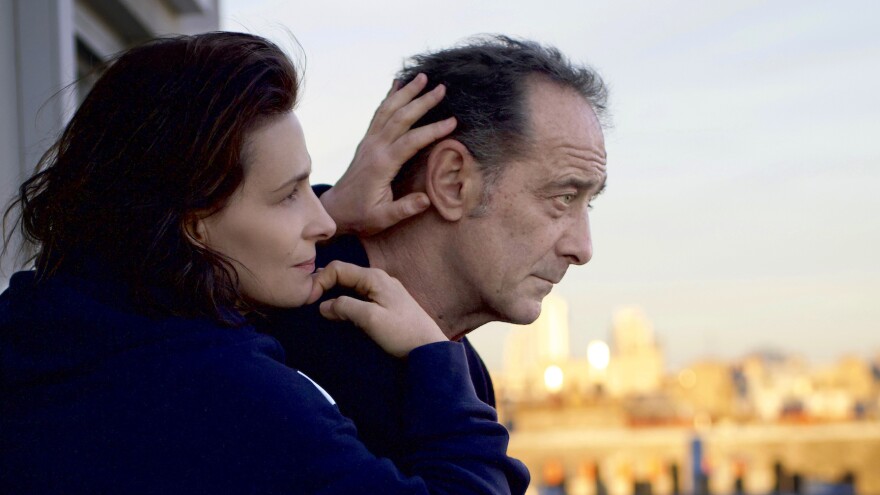Both Sides of the Blade might sound at first like a quintessentially French movie, or perhaps even a parody of one. It stars Juliette Binoche and Vincent Lindon, two of France's best-known actors, as a couple who have a lot of sex and talk a lot about their emotions. Their scenes together have an erotic intimacy that we associate with French cinema, in part because it's relatively rare in American movies. Then a figure from the past returns and threatens their relationship; voices are raised, tables are turned and nothing will ever be the same.
That might make Both Sides of the Blade sound like standard soap-opera material, especially coming from Claire Denis, the director of daringly elliptical art films like Beau Travail and High Life. But nothing about the movie, which Denis and Christine Angot adapted from Angot's novel, feels trite or predictable. It's a jolt of a movie, full of hot-blooded sensuality one moment but then oddly cool and studied the next, almost as if it were deconstructing itself as it went along. Which, again, sounds very French, but never mind.
Binoche and Lindon give superb performances as Sara and Jean, who've lived together for about 10 years and still can't keep their hands off each other. They have an apartment in Paris, where they've carved out what looks like a perfect life amid decidedly imperfect circumstances. Sara hosts a successful radio talk show, but work is less steady for Jean, who spent some time in prison for an undisclosed crime. He also has a tough relationship with Marcus, his teenage son from an earlier marriage, who lives with Jean's mother in the suburbs.
Then one day, François, played by Grégoire Colin, slips back into their lives. He used to be Jean's colleague and Sara's lover. It begins innocuously enough, when François offers Jean a job at his sports talent agency. But Sara can't hide her anxiety or her excitement at the prospect of seeing François again, and when they finally meet, long-repressed memories and desires come surging back. Inevitably Sara will succumb to those desires, but the movie, set to a haunting score by the English band Tindersticks, wrings enormous tension from the buildup.
The title of Both Sides of the Blade evokes the age-old question of whether a person can love two people at the same time. And Binoche, so good at revealing complex, contradictory emotions, shows us a woman torn between a partner she adores and an ex she can't forget. This is the latest collaboration between Binoche and Denis, and it'd make a great double bill with their recent rom-com Let the Sunshine In, a much funnier story about a woman's emotional indecision.
Binoche is well matched here by Lindon, whose handsome, weathered face suggests a man who's already lost too much and can't bear the idea of also losing the woman he loves. Jean is quick to pick up on the warning signs and confronts Sara. I've seen a lot of heated arguments in movies, but few have been acted or shot with this much sustained intensity. Denis is a master of form, and she uses extreme closeups and jagged edits to suggest that something has broken between these two, possibly for good.
But even as she pulls her characters close, Denis sometimes steps back and examines them from a more critical perspective. As a radio host, Sara interviews a lot of writers and artists, often about racial and political issues that she doesn't engage with much outside work. Jean's son is a Black biracial youth who's struggling to figure out his future, and there's an awkward but moving scene in which he and his father talk about race and discrimination. On top of all that, this is one of the few movies shot during COVID that acknowledges the reality of the pandemic, as we can see from the characters repeatedly putting on and taking off their face masks.
There's something a little ungainly about how Denis balances her characters' romantic anguish with these bigger-picture concerns, but that messiness seems to be the point: Even when illicit desires intrude and relationships fall apart, real life doesn't just politely recede into the background. Both Sides of the Blade wants us to see its characters rage, but it never loses sight of the larger world raging outside their windows. It's a different kind of melodrama — and a great one.
Copyright 2022 Fresh Air. To see more, visit Fresh Air.







